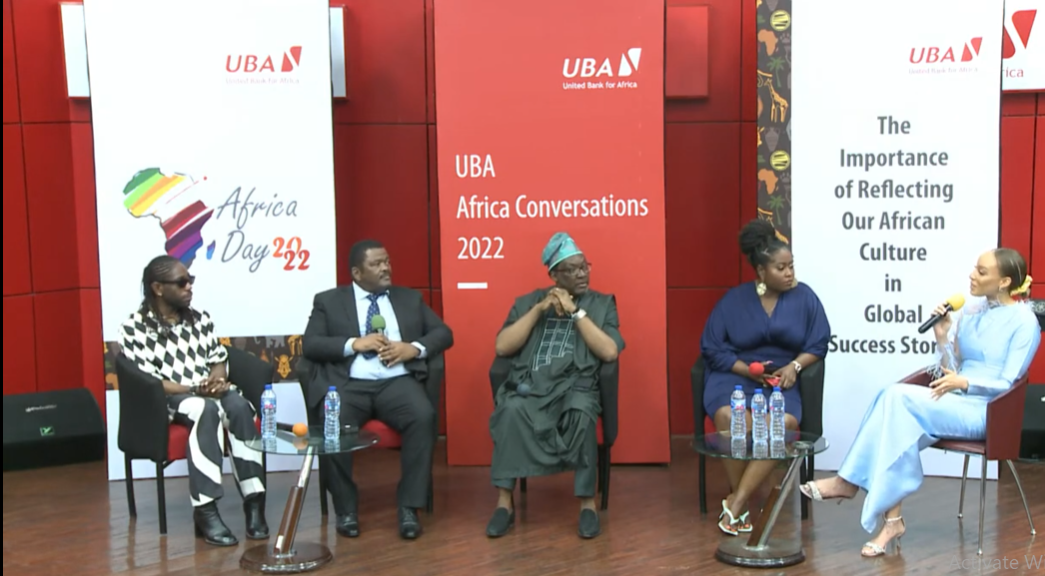By Felicia Nwosu
To unite and dignify Africa through its rich cultural heritage, dismantle antiquated racial idioms that misrepresent the continent’s diverse cultural expressions and notions of creativity, the United Bank for Africa (UBA) has joined the rest of Africans to celebrate the 2022 Africa Day. The African conversational platform pioneered by UBA to create a forum for Africans where they can engage in conversations that will steer continuously towards fostering growth and development on the African continent is in its 4th series.
In commemoration of this year’s edition with the theme, “The Importance of Reflecting Our African Culture in Global Success Stories”, the speakers reminded Africans of the need to stay true to their roots as they continue to change the African narrative in a positive way.
Setting the tone as this year’s keynote speaker, Youssou Ndour, a Senegalese singer, songwriter, and composer reminded Africans that a river must never forget its source or else it looses its ancestral history and lineage. The Grammy award winner and former Senegal’s Minister of Tourism charged Africans to continue reimagining the potential of Africa through the lens of culture and deeper storytelling.
“You must never forget where you come from, your values, family, environment, and the struggles for the entire continent are very important. We should listen to the youths, and together we can build tomorrow’s world and tomorrow’s Africa. Every youth has a duty to the African continent. When you have the opportunity to be an African ambassador you have to carry with you good things about Africa, and also listen to others so that we can be in harmony with the world. There are a lot of things about Africa that are not known abroad or other continents. It is our role to showcase the good image of Africa and I think that art can help us to get it right,” he said.
Also speaking, Steve Ayorinde, former Commissioner of Tourism, Arts & Culture, Lagos State, pointed out that African culture, if strategically projected, could earn the continent respect globally. He noted that Africa is making a powerful statement through music and movies with the infusion of culture and is as well bridging whatever gap that exists with it.
“Where we are now is that nobody denigrates African culture any more. You don’t covet what you don’t respect. You see what is happening all over the world in terms of the growing appreciation for African culture which is seen essentially through the type of movies and music that we are churning out to the world. Afrobeat with the ‘S’ has become a kind of global phenomenon now. We may not be there at the level where we will say that we are at par with the world, and that is because of the fact that we are still evolving,” he said.
“We are gradually changing the inaccurate narrative about African culture and our history, but it is improving and will improve a lot more when the African media is constantly putting things of culture on the front burner, and when we do not treat matters of culture as mere entertainment. When we do not think that once a news item is needed as filler, what you go for is culture or art or entertainment,” he added.
Humphrey Geseib, High Commissioner of Namibia to Nigeria, on his part, looked back to the dark days of the Namibia liberation struggle and how the unified support of African countries saved the country from colonialism. He, therefore, challenged Africa to blow its own trumpet to the world by telling its own story through the use of ingenuity and creativity to amplify the continent’s diverse heritage and dignity.
“The issue of respect for African cultures should start with the Africans in focus. The question should be whether Africans are respected globally and then proceed to African culture. We have seen many cases where the requisite respect for Africa sometimes is lacking. But the onus rests on our shoulders to ensure that Africa assumes her dignified place in the world. That is when all of us can walk tall and be proud because we don’t owe our dignity to anybody else but us. We are just one people and our aspirations and interests are all common. We need a unified Africa where all its citizens are benefiting, an Africa that is thriving for each of its people, and an Africa that makes everyone proud to be African.”
Other discussants include: Kenneth Ize, LVMH prize finalist and designer, Award winning Ghanaian actress, Lydia Forson while Laila Johnson-Salami was the moderator.






Comment
No comments found.